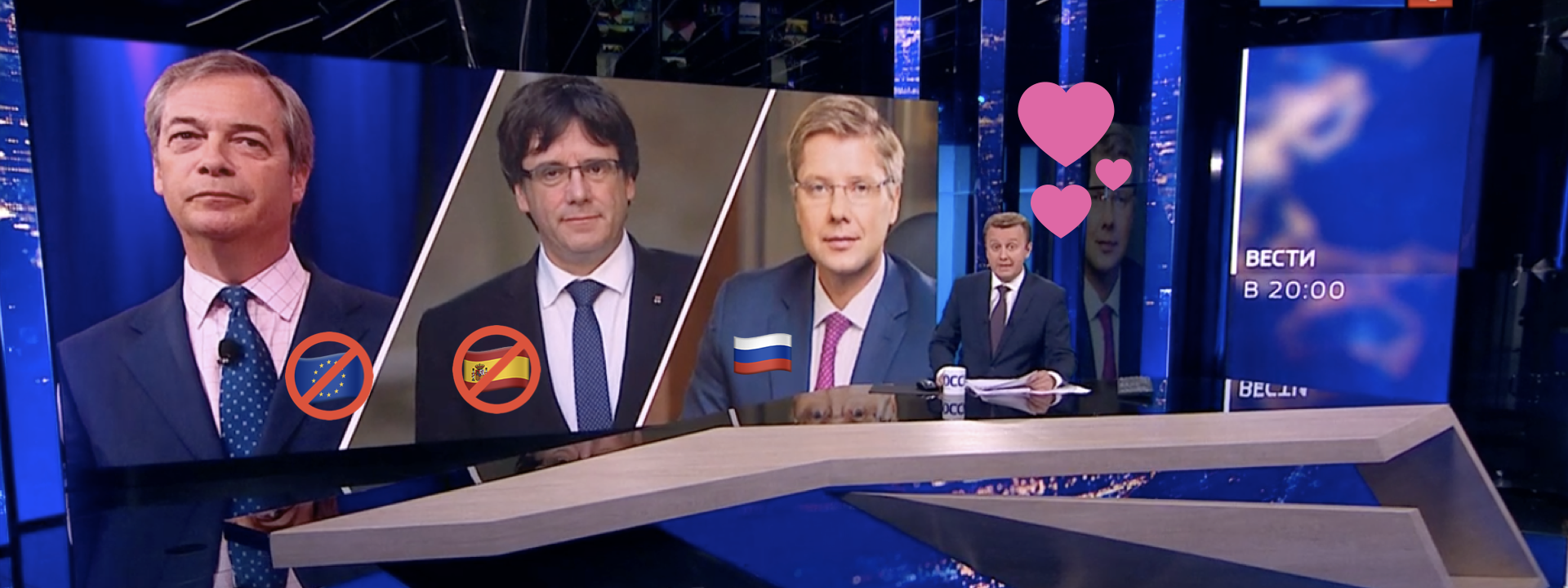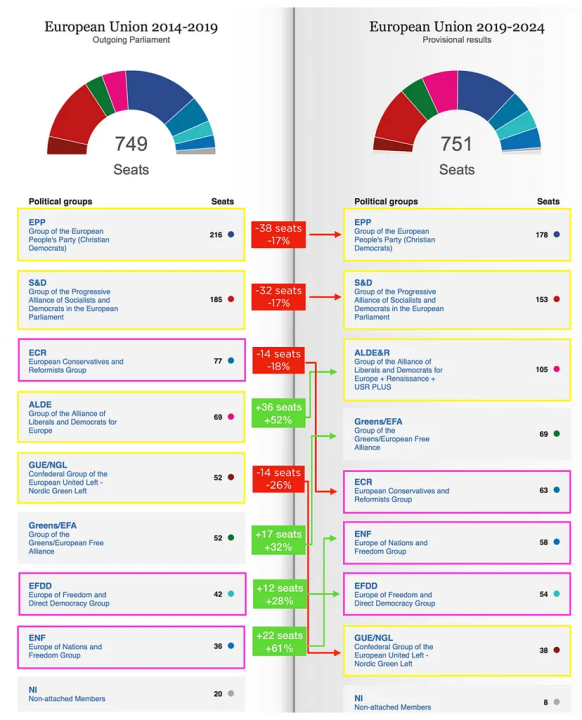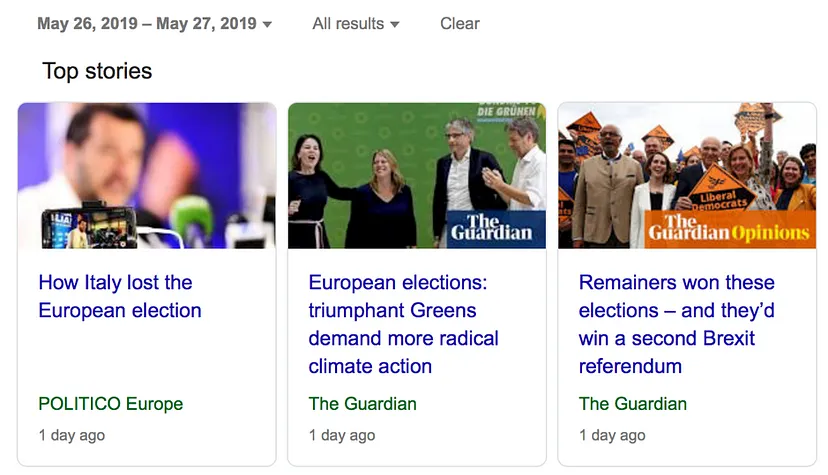“Putin’s Faction” in the European Parliament
Kremlin media celebrate victories of “Putin’s friends” in the 2019 EP elections
“Putin’s Faction” in the European Parliament

BANNER: (Source: @nikaaleksejeva/DFRLab via Russia.tv)
Kremlin-owned and pro-Kremlin media outlets focused on the victory of candidates who favor good relationships with Russia or promote Eurosceptic positions in their coverage of the European Parliament (EP) elections.
The EP elections took place from May 23 until May 26, 2019. Experts predicted that far-right and populist movements would achieve significant gains, though the results generally defied those predictions. If those parties had gained a considerable number of seats in the EP, the European Union would likely make it more difficult for the EU, as a bloc, to criticize far-right leaders in member countries, such as Victor Orbán of Hungary.
The evidence of the Kremlin’s support for its favored candidates underscores its interest in promoting far-right and anti-establishment parties in Europe. Throughout the campaign season, several reports emerged that sources affiliated with the Kremlin had provided financial support to several such parties.
In February 2019, two Italian investigative journalists suggested that Kremlin-linked Russian businessman Ilya Yakunin had offered to support Mateo Salvini’s far-right party Lega Nord with €3 million for the EP elections. Similarly, the leader of the far-right Rassemblement National party in France, Marine Le Pen, who is well-known for her pro-Kremlin and anti-European Union stance stretching back to the 2017 French presidential elections, allegedly received a “Kremlin-authorized” loan worth €20 million in 2014.
The Results
Contrary to what some analysts had predicted, right-wing populist parties did not gain significant representation in the next European Parliament. In particular, the two most popular — and old establishment — parties remained the European People’s Party (EPP) and the Progressive Alliance of Socialists and Democrats (S&D), which will again have the most representation at 179 and 153 seats, respectively. The two groups combined to form a ruling coalition in the previous legislature.

The Europe of Nations and Freedom (ENF) group — a far-right alliance comprised of Salvini’s Lega Nord, Le Pen’s Rassemblement National, and other populist parties from around the EU — increased its representation by 22 seats, a 61 percent gain. While it was the largest percentage gain for any alliance, it was not the largest numerical seat gain, which belonged to the Alliance of Liberals and Democrats for Europe (ALDE) with its increase of 36 seats.
Another Eurosceptic group, the Europe of Freedom and Direct Democracy (EFDD), which unites the anti-EU Brexit Party and the anti-immigrant Alternative for Germany (AfD) party, among others, garnered 12 more seats, a 28 percent increase. Together with the ENF, this contingent gained 34 more seats, which is fewer than ALDE gained.
Because of these gains and their own losses, EPP and S&D lost the ability to form a majority coalition on their own, as they will now hold a combined 331 seats out of the 376 necessary. Instead, they will have to find other groups or alliances to join their coalition in order to form a majority. The ENF and EFDD, however, are unlikely to be the choice to join the coalition government and will likely remain in opposition.
The Kremlin’s View
The top stories on RT, the largest English-language Kremlin-owned media outlet, shortly after elections emphasized the gains of right-wing and green parties as a sign that European voters were “fed up” with the establishment parties. (The EPP and S&D are considered center right and left, respectively, so their loss points to movement away from the center.)

The top stories on the Kremlin-owned news agency RIA Novosti, which reports in Russian, focused on Le Pen’s victory, Macron’s losses, and the news that Greek Prime Minister Alexis Tsipras had called for early national elections after his party suffered defeat in the EP elections. The news story presented the Tsipras defeat as a failure of a EU country, while his defeat was in fact largely driven by the victory of the New Democracy party (33.12 percent of total votes), which is part of the pro-EU EPP group.

By comparison, the top stories for the keywords “European elections” in English featured articles by Politico and The Guardian. The articles mentioned the victory of the Greens and expressed support for Brexit “remainers.”

Celebrating the Victory of “Putin’s Faction”
During its evening news broadcast, the Kremlin-owned television channel Rossiya 1 presented the results of the EP elections as a total win for far-right and anti-establishment parties. A Russian YouTube channel, whose name translates to “Politics Today: Russia, USA, Ukraine,” posted an excerpt from the news broadcast about the elections. The video included a sensational title allegation that “the far-right has shaken the ground as promised” and garnered 126,533 views, 929 likes, and just 80 dislikes.
In the clip, the anchor said:
For the first time in 40 years, the main parties have lost their majority vote, but nationalists and Eurosceptics have strengthened their positions. The Brits voted for the Brexit Party, Catalans for their independence leader [Carles] Puigdemont, but Latvians for the laid-off Riga Mayor [Nils] Usakovs.
Carles Puigdemont is the controversial leader of Junts per Catalunya, a separatist party advocating for the independence of the Catalunyan region of Spain. Puigdemont has a turbulent legal history in Spain, mostly around the issue of Catalan independence, and has spent time in self-exile from the country out of fear of arrest and prosecution. The United States Senate, among others, assessed that Russia had provided quiet support for the region’s independence, a charge Puigdemont rejected.
The reference to Usakovs as “laid-off” was less of a snide remark than a callback to the Kremlin media’s previous claim that Usakovs’s firing was a method of removing a pro-Russian Latvian politician from office. Usakovs, however, resigned under pressure of a corruption investigation after he got elected in EP.
While Puigdemont and Usakovs were elected, Puigdemont’s Junts per Catalunya came in seventh overall in Spain, garnering just 4.58 percent of overall votes. Meanwhile, Usakovs’ Saskana Party came in second and garnered 17.45 percent of votes, which is almost 9 percentage points fewer than the most popular party in Latvia, Jauna Vienotiba. The Kremlin previously supported the Catalan independence movement, and Usakovs’ Saskana previously had a cooperation agreement with Putin’s United Russia Party.
The news story further celebrated the major support Italian voters showed to Salvini’s party (34.33 percent of the vote) and the victory of the United Kingdom’s Brexit Party (30.75 percent of the vote), with particular plaudits for its Eurosceptic leader Nigel Farage. Farage formerly led the United Kingdom Independence Party (UKIP) in the European Parliament, where the party voted in favor of Kremlin interests at key moments.
On the results in France, the story characterized it as a total victory for Le Pen’s party, Rassemblement National. The RN garnered 23.31 percent of the vote and 22 seats, while the second-place party, Renaissance, which is aligned with French President Emanuel Macron, garnered 22.41 percent of the vote and 21 seats. Le Pen’s winning margin was too narrow to suggest that the RN had won the “Referendum of Trust.” Besides, the overall votes for pro-EU parties totaled well above RN’s total, at 40 total seats to 22, respectively.
In addition to the Kremlin-owned media coverage favoring the far-right and anti-establishment parties, several Russian media outlets openly celebrated the alleged victory of pro-Kremlin forces in EP elections.
A niche Russian media outlet focusing on military affairs called Voennoe Obozrenie published a news story titled “European Parliament is Ours. Le Pen and Salvini are Leading in European Parliament Elections in France and Italy.”
The story garnered 766 shares on Facebook, according to social media analysis tool Buzzsumo.

The pro-Kremlin media outlet Vzglad published an article by a journalist named Petr Akopov titled “What ‘Putin’s Faction’ Will Achieve in European Parliament.” In the lead paragraph, the author explained that the so-called “Eurointegrators” had invented the “Putin’s Faction” term, and added:
The fraction will not be able to extremely change the policy of European Union for now, but in next elections in 2024, it will be able to destroy Europe, the same developers of United Europe think.
Another pro-Kremlin media outlet Rambler picked up the story and published a summary version of the article. The lead sentence read:
“Putin’s Faction” appeared in the European Parliament– now it is helpless, but in 5 years it will destroy Europe. Vzglad writes about it.
Overall, the keyword “Putin’s Faction” appeared on three media outlets and garnered just 89 shares, mostly on Facebook.

Overall, Kremlin-owned media coverage largely focused on Salvini’s, Le Pen’s, and Farage’s successes in the EP elections, while minimizing losses of other pro-Kremlin politicians in Europe. This pattern of coverage emphasized the Kremlin’s tendency to support and promote European politicians with an anti-establishment perspective who often promote Eurosceptic policies.
Read more DFRLab #ElectionWatch posts here.
Register for the DFRLab’s upcoming 360/OS summit, to be held in London on June 20–21. Join us for two days of interactive sessions and join a growing network of #DigitalSherlocks fighting for facts worldwide!

